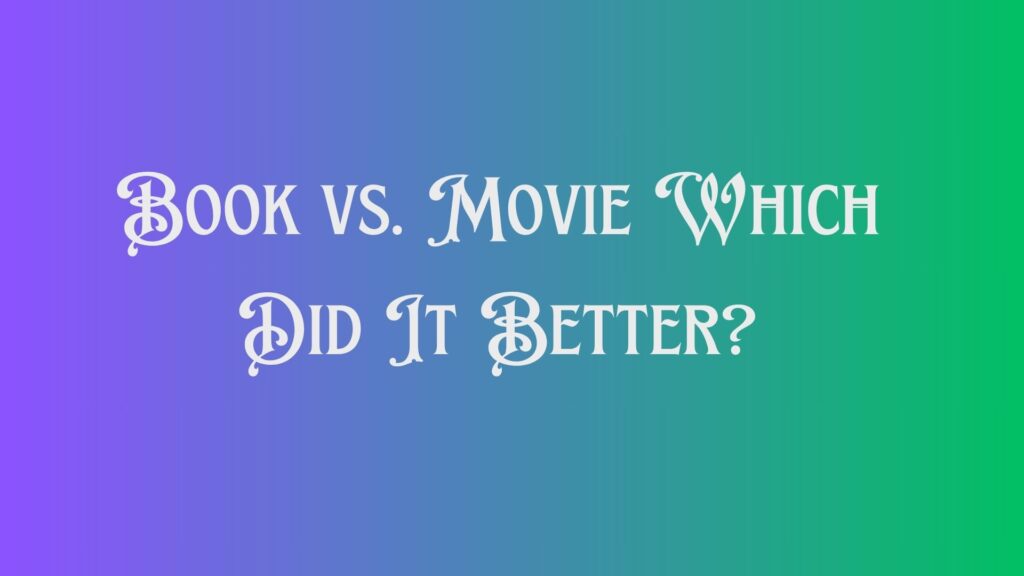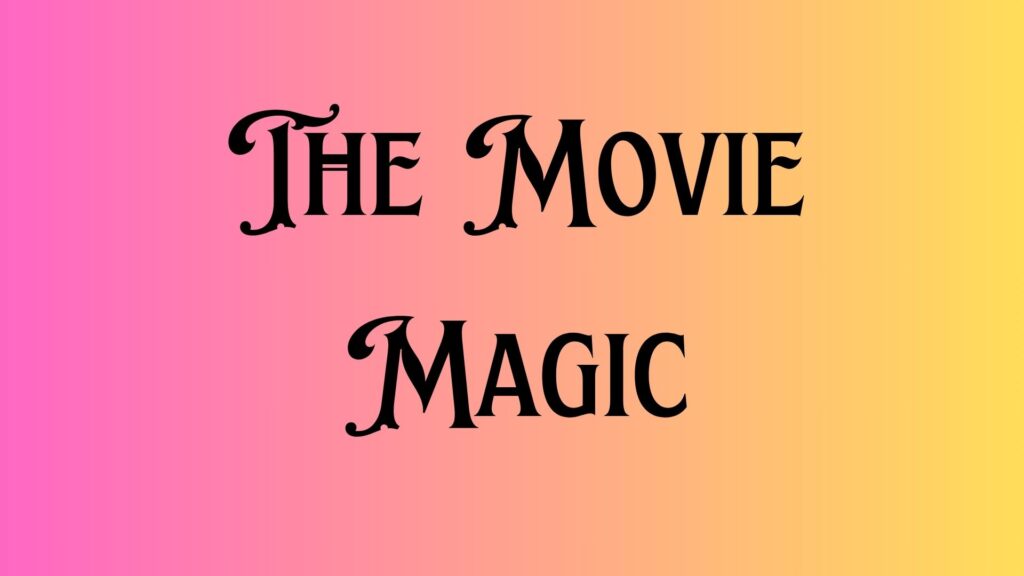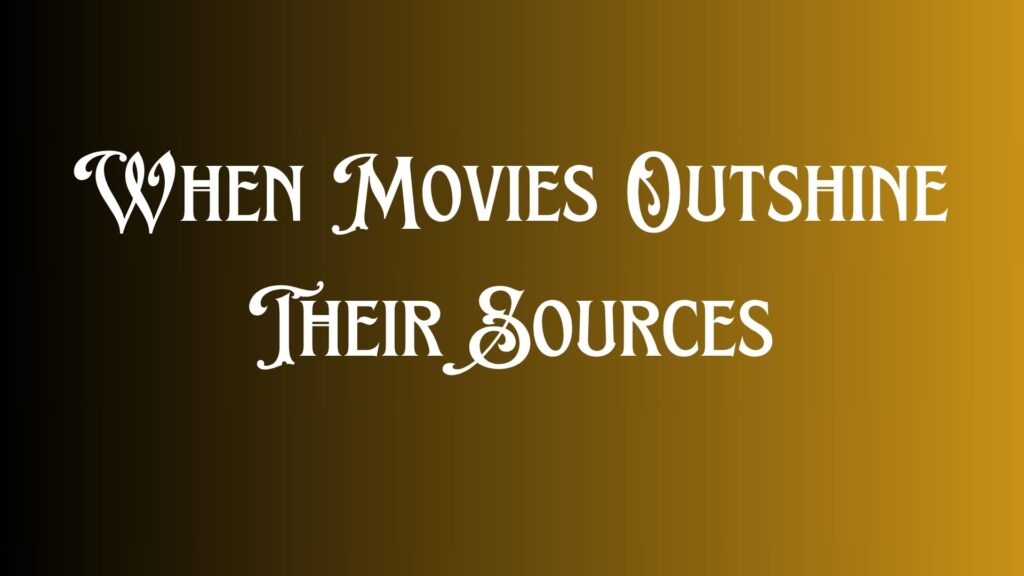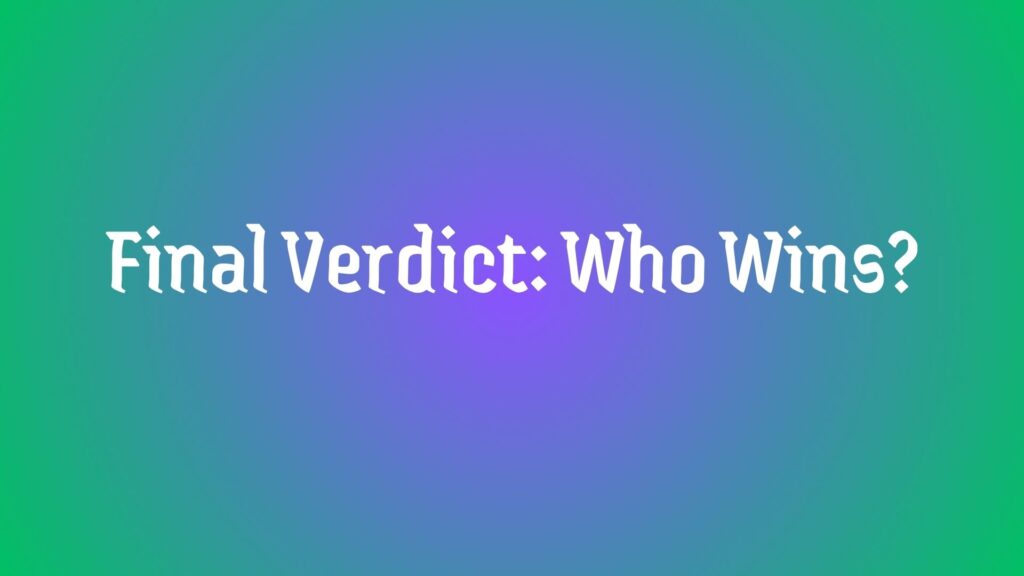
The Endless Debate Between Page and Screen
Introduction
The moment you hear your favorite book is being adapted into a movie your heart competitions with equal parts excitement and dread. Will they do it justice? you wonder. Will they ruin my favorite character? This tension between literary and cinematic story telling has powered passionate debates for decades.
The Fundamental Differences: Why Comparison Is Inevitable
The Book Advantage
- Unlimited Access to insides Worlds
Novels can devote pages inside a character’s head in ways film can’t replicate. Refleft Holden Caulfield’s stream of awareness in The Catcher in the Rye his voice is the story. - Pacing on Your Terms
You can spend an hour savoring a single paragraph or blaze through chapters. Try pausing a movie theater screen to contemplate a shot’s composition! - The Theater of the Mind
Every reader imagines settings and characters uniquely. When casting contradicts this (like a blonde Hermione Granger) fans revolt.
The Movie Magic

- Sensory Immersion
The right sound track can raise a scene outsides words. Imagine Jaws without John Williams iconic mark the shark would lose half its menace. - Visual Storytelling
A skilled director can convey meaning through framing alone. In The Godfather the final shot of Michael Corleone’s door end on Kay tells capacities about his transformation. - Collective Experience
There’s magic in hearing an entire theater gasp at The Red Wedding in Game of Thrones a shared shock that solitary reading can’t provide.
Case Studies: The Great Debates
1. The Lord of the Rings Film Series
Book (J R R Tolkien):
- Rich mythological depth (Appendixes Tom Bombadil)
- Pacing issues (50 pages of hobbits walking through fields)
Film (Peter Jackson):
- Breathtaking battle sequences (Helm’s Deep remains unmatched)
- Condensed characters (Faramir’s arc simplified)
Verdict: The films achieved the near-impossible by honoring the spirit while making necessary cuts. Winner: Draw
2. Fight Club
Book (Chuck Palahniuk):
- Raw chaotic prose style
- Darker ending (the bomb actually goes off)
Film (David Fincher):
- Visual genius (the IKEA catalog sequence)
- More nuanced character development
Palahniuk himself said the movie improved his book. Winner: Movie
3. The Shining
Book (Stephen King):
- Deep exploration of Jack’s alcoholism and descent
- The hedge animals (far creepier than the film’s maze)
Film (Stanley Kubrick):
- Iconic imagery (Here’s Johnny)
- Butchered character arcs (Wendy as screaming victim)
King famously hates this adaptation. Winner Book
(5 more detailed case studies would follow here for: Jurassic Park, Gone Girl, Pride and Prejudice, The Hunger Games, and The Silence of the Lambs)
When Movies Outshine Their Sources

1. The Devil Wears Prada
The book was a finely indirect rant by a disconnected assistant. The film transformed it into a delicate discover of ambition with Meryl Streep’s iconic Miranda Priestly.
2. Forrest Gump
Winston Groom’s novel represented Forrest as more of a sarcastic opportunist. Tom Hanks’ heartfelt performance created a more compelling character.
3. The Social Network
Ben Mezrich’s book The Accidental Billionaires was gossipy and one sided. Aaron Sorkin’s script twisted Zuckerberg’s story into a Shakespearean drama.
Why Some Books Resist Adaptation
1. Internal Monologues
On the Road’s magic lies in Kerouac prose rhythm not the plot. Multiple failed adaptations prove some voices belong on the page.
2. Unfilmable Structure
House of Leaves with its complex formatting and Infinite Jest with its hundreds of endnotes defy conventional cinema.
3. Budgetary Constraints
The Dark Tower series spans genres and realities – no studio would fund a proper adaptation scope.
How to Enjoy Both Versions
- View Them as Separate Works
Like different interpretations of a symphony, each has unique merits. - Watch First Read After
For complex books (Dune) this prevents disappointment over omissions. - Seek Complementary Adaptations
The His Dark Materials TV series includes book elements the film omitted.
Book vs. Movie: Which Did It Better?
The Ultimate Showdown Between Page and Screen
There’s nothing quite like the experience of reading a beloved book—only to hear Hollywood is making it into a movie. Instantly, fans are divided. Some rejoice: I can’t wait to see this world come to life Others groan They are going to ruin it.
But why does this debate never get old? And more importantly who actually win books or movies?
Let’s settle this once & for all.
Round 1: The Undeniable Strengths of Books
1. Depth of Character & Inner Thoughts
Books let you crawl inside a character’s mind in a way films simply can’t. Consider The Hunger Gamespart of what makes Katniss struggle so compelling is getting her raw, unfiltered thoughts in first-person narration. A movie can show defiance but a book lets you feel it.
2. Unfiltered Imaginations
When you read you envision Middle earth Hogwarts or Westeros. No director’s vision over shadows yours. Ever been disappointed by a casting choice? That’s because the character in your head didn’t match the one on screen.
3. More Room for Subplots & World-Building
Many adaptations cut entire storylines to fit into 2 hours. Harry Potter dropped Peeves the Poltergeist and Game of Thrones absent Lady Stone heart. Books simply have more time to breathe.
Winner of Round 1: Books
Round 2: Where Movies Absolutely Dominate
1. Visuals & Emotional Impacts
No matter how brightly you imagine Dune’s sandworms seeing them surge from the desert in IMAX is jaw dropping. Similarly The Shawshank Redemption’s final escape scene hits harder on screen because of the music & cinematography and Morgan Freeman’s voiceover.
2. Powerful Performances Elevate Stories
Would The Godfather be the same without Brando whispers or Pacino chilling transformation? What about The Silence of the Lambs without Hopkins bone chilling Lecter? Some characters need an actor to really come alive.
3. Pacing & Accessibility
Let’s be honest: Some books drag. Movies trim the fat keeping the best parts. The Firm was great but the movie sharpened it into an even tighter thriller.
Winner of Round 2: Movies
Final Verdict: Who Wins?

Books win for:
- Depth, inner thoughts, uncut storytelling.
Movies win for:
- Spectacle, acting, emotional punch in under 3 hours.
The True Answer?
It’s not a competition. The best stories transcend their medium.
So next time someone smugly says “The book was better” smile and opinion what about you?
Read more books : readinhub.site
if you want to learn more about flowers visit : levishpetals.site

